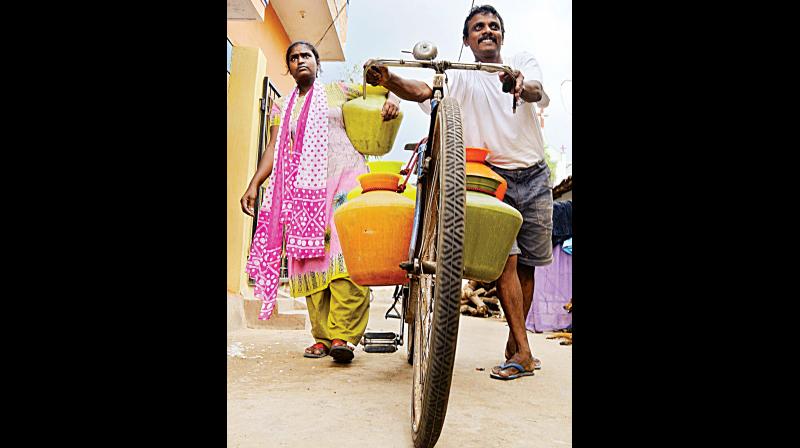Cry us a river, BWSSB, the Cauvery's running dry!

Summer is several months away but people living on the city’s outskirts are already facing a water crisis. When will the BWSSB understand that an over-reliance on the Cauvery is not the solution? Cauvery supply is reduced in those areas that receive it during times of scarcity, creating water problems where there are none! Alternative sources can give us more than we need, so why doesn’t the BWSSB look into this?
It’s not summer yet and already people living on the outskirts of the city are short of water. With the storage levels of major reservoirs of the Cauvery river, including the Krishna Raja Sagar touching a 15 year low, the city could be in for a drier than usual summer, leaving people at the mercy of unscrupulous tanker operators.
One often suggested solution is to reduce the city’s dependence on the far away Cauvery reservoirs and revive the closer to home Hessarghatta and Thippagondanahalli reservoirs, popularise rain water harvesting and use treated sewage water for its non-potable needs.
Guest column: Rather than water security, what we need is water sovereignty
Says water expert and coordinator of energy and wetland research Dr T.V.Ramachandra, "Bengaluru needs around 18 to 20 TMC of water every year. If it harvested rain water and revived its lakes it could get 15 TMC rightaway. And if it treated the 16 TMC of sewage it generates, it could get another 14 TMC of water. So it could in fact, have surplus water if it implements these measures." Also, while currently, the city draws 19 TMC of water every year from the river Cauvery for its needs, some BWSSB officials suggest the now defunct Thippagondanahalli and Hesaraghatta reservoirs could provide it at least 2.5 TMC, if revived.
Pointing out that the two reservoirs supplied water to Bengaluru in the past, they recall that the Hessarghatta dam ran dry a couple of decades ago and has not been tapped since.
Bengaluru Development Minister, K.J. George seemed keen on the idea himself during a visit to the Hesaraghatta reservoir last month. Speaking of reviving the reservoir , he said water from the Yettinahole river in the Western Ghats would be diverted to it to make this possible. While not many experts would quarrel with the idea of reviving the reservoir, Dr Ramachandra believes its foolish to use the Yettinahole river water to achieve this.
Meanwhile , the BWSSB is currently preparing a detailed project report to de-silt the Hessarghatta reservoir and fence it. It also plans to install a plant to treat the sewage polluting Thippagondanahalli. But an official admits it will take a while to revive the two reservoirs and make them fit enough to supply water to the city again.
Water board asked to step up maintenance of borewells
With the city having received little rain in October and November and no sign of December being any wetter, summer 2017 could be harsh on it, leaving it parched for water. Sensing the looming crisis, the water board is preparing to avert it by already beginning to reduce the frequency of water supplied to a few areas.
Contending the board has little choice in the matter, a senior BWSSB official says water is being supplied once in every three days now to areas accustomed to getting supply every alternate day. It is also making sure that borewells are in good shape so they can be relied on in summer to partially meet the city's needs.
“Our officials have been instructed to take steps to maintain the 7,932 borewells under the board’s control. They have been asked to attend to complaints of defunct borewells and pumps and keep them ready for summer,” the official added. The water board, which owns 68 tankers, plans to use them as well to help supply water to areas that run dry in summer. "Based on the situation, we will supply water using our own tankers. But if things worsen, we will hire private tankers to supplement our supply and make sure that people are not affected," he assured.
BWSSB action plan for summer 2017
- BWSSB will use its 68 tankers and also hire private tankers, if necessary, to supply water to areas facing a shortage of water.
- It plans to keep its 7, 932 borewells in good shape for summer and may sink new borewells as well.
- Measures to keep 7,932 borewells owned by the water board is on. Officials have been directed to attend to defunct borewells, pumps and keep them ready as soon as possible. Apart from these, BWSSB may drill new borewells.
- Besides making rain water harvesting compulsory, BWSSB has made it mandatory for small apartment complexes with 20 and more apartments to set up sewage treatment plants.

